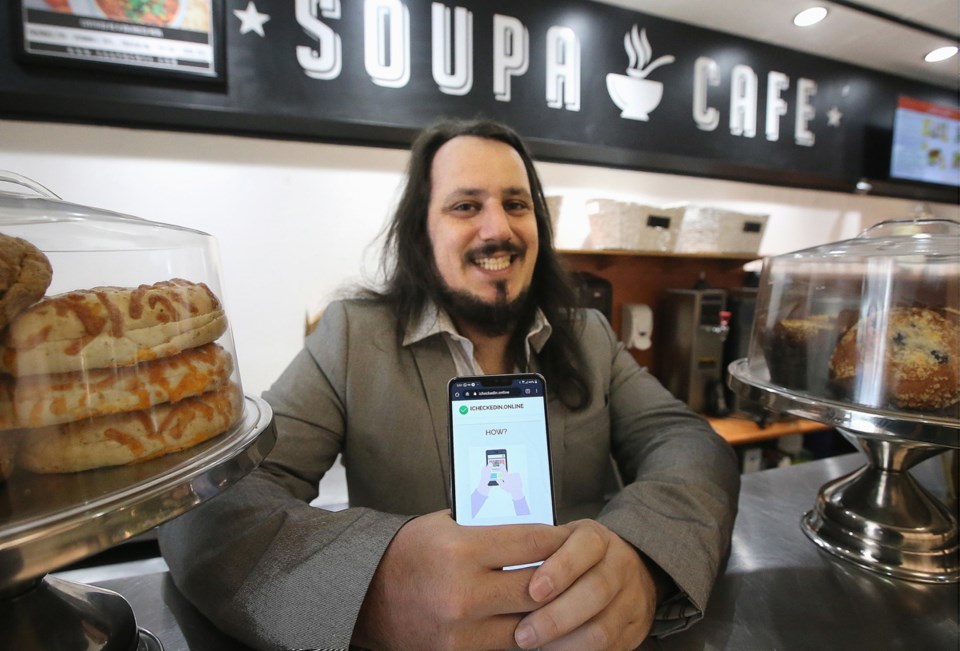Restaurants tasked with collecting the names and contact information of their diners say they are following the new order from the provincial health officer and receiving little or no pushback from customers.
Some establishments are going further, requiring diners to undergo touchless temperature checks before entering, even though it isn’t required by the province’s reopening guidelines.
Dr. Bonnie Henry said June 10 that restaurants taking reservations are required to get a name and a phone number or email from at least one person in any dining party and keep it on file for 30 days for contact tracing in the event of a COVID-19 outbreak.
Shellie Gudgeon, owner of Il Terrazzo downtown, said staff are recording names and contact information in a reservation book and diners seem fine with the idea. “If it keeps everyone safe, then it’s good,” she said. “It’s the old-school method, writing the names and phone numbers down.
“The difference is we used to destroy the reservation sheet at the end of the night. Now we’re required to hold it for a month.”
When the Fairmont Empress Hotel opens its doors Friday after a shutdown of more than three months due to the pandemic, diners and bar patrons won’t just be asked for contact information, they’ll have to agree to a temperature check at the door.
Tracey Drake, public relations director for the Empress, said the hotel is following all provincial reopening guidelines — even exceeding them — for the safety of guests and staff.
Baan Thai, which has three locations in Greater Victoria, will also be using temperature checks on diners when it reopens its dining rooms soon. Manager John Carreiro has asked the provincial health officer to loosen some distancing restrictions (from two metres to one) that he says severely limit smaller restaurants, in exchange for measures such as the temperature checks on staff and customers and robust contact tracing.
Gudgeon said Il Terrazzo checks the temperatures of its staff and might require it from customers in the event of a resurgence of COVID-19.
Mike Murphy, who owns the 10 Acres Farm Restaurant Group and is opening a new café and market restaurant in Sidney this week, said his establishments are collecting personal information of diners. But he said the best way to keep track is through credit and debit cards, through which “99.99 per cent per cent of customers pay.”
“Every credit card is associated with a person, what they had and at what table,” said Murphy. “We can also quickly identify the tables around it and what they had.”
The names and contact information are already documented for takeout orders, so most restaurants will be storing that data, too.
Although the provincial health officer’s order only mentions restaurants that take reservations, Ian Tostenson, chief executive of the sa���ʴ�ý Food and Restaurant Association, said almost all restaurants in the province are now asking for patrons’ contact information, and customers are on board.
Tostenson said it’s against the law to use the information for any other purposes, a point echoed by sa���ʴ�ý’s privacy commissioner, Michael McEvoy.
McEvoy said data should be collected from only one member of a party, and it should be clearly explained what information is being collected and why.
Establishments should not collect a patron’s physical address or other contact information, such as where they work, and should not use or disclose the collected information other than to provide it to the provincial health officer upon request, said McEvoy, suggesting a copy of Henry’s order be kept handy
If information is shared with the provincial health officer, details of that transaction should be recorded, he said.
McEvoy stressed the information should not be used for marketing or analytics.
Avi Lugassy, who co-owns Soupa Café in downtown Victoria, this week is rolling out his “I Checked In” subscription app, which allows customers to list a contact within their group and provide the date and time of their visits.
The information doesn’t track movements, is encrypted and is only handed over to health authorities if requested for investigating COVID-19 cases, Lugassy said. “Venues never actually know your personal information.”
Lugassy said the app reduces the workload for servers and other front-end staff, and prevents the loss or mishandling of information that’s written down. “We encrypt your information from start to end,” he said.
For businesses, the app is a no-contact check-in and also a place for menus, or for social-media links or websites for subscribed businesses, he said.
Businesses sign up for the service and create a personal identification number that also generates a QR code.
Each venue could be slightly different, but the way it could work is that customers would see a QR code to scan at the entrance to the venue — or on a tabletop — that would direct them to the I Checked In app, or a menu with a link to the app. On the app, they would leave their name and number, which is encrypted along with the venue they visited and the time they checked in.
“In the event of an outbreak, the venue will notify us immediately and we inform relevant bodies so the phone calls can be made.”
He said venues can add the service directly to their own websites.
Lugassy is starting to market the app and said he is meeting this week with major restaurants and bars in the region.
The subscription fee for businesses is $40 a month.
— With a file from Glacier Media



